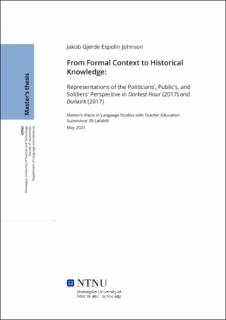| dc.contributor.advisor | Løfaldli, Eli | |
| dc.contributor.author | Johnson, Jakob Gjerde Espolin | |
| dc.date.accessioned | 2023-07-19T17:19:45Z | |
| dc.date.available | 2023-07-19T17:19:45Z | |
| dc.date.issued | 2023 | |
| dc.identifier | no.ntnu:inspera:145064670:34497059 | |
| dc.identifier.uri | https://hdl.handle.net/11250/3080334 | |
| dc.description.abstract | Denne masteroppgaven tar for seg hvordan Joe Wrights Darkest Hour og Christopher Nolans Dunkirk, begge fra 2017, formidler fortiden ved hjelp av den historiske filmsjangeren som uttrykksform. Oppgaven analyserer filmenes formelle aspekter, inkludert mise-en-scène og mise-en-historie, for å forstå hvordan de representerer historisk kunnskap gjennom filmmediet. Utgangspunktet for oppgaven er at all historie er en tolkning av fortiden og at historiske fremstillinger, enten de publiseres i akademisk forskning eller formidles gjennom film, har en viss grad av sannhetsverdi så lenge de bygger på og tar utgangspunkt i tidligere hendelser eller personer. Både Darkest Hour og Dunkirk skildrer hendelsene under Operation Dynamo ved å modellere og figurere den historiske verden, og fungerer med det som kilder til historisk kunnskap og representasjon. Darkest Hour fokuser på de politiske manøvrene bak kulissene i Operation Dynamo og portretterer Winston Churchill som en isolert leder som kjempet alene, men med målrettet og sterkt lederskap. Filmen formidler en representasjon av et forent Storbritannia og vektlegger betydningen av sterk ledelse for nasjonal triumf. På den andre siden skildrer Dunkirk perspektivet til soldatene og befolkningen, og bruker Theory of Mind for å engasjere publikum, samt skape en empatisk forbindelse til hendelsene og karakterene som blir portrettert på skjermen. Ved å skape historisk kunnskap gjennom en troverdig historisk opplevelse, presenterer filmen en realistisk, men fiktiv, fremstilling av historiske hendelser med fokus på historiske detaljer. Begge filmene forsterker en følelse av nasjonal enhet, og analysen erkjenner viktigheten av historiske filmer i forhold til kollektiv hukommelse i en postkolonial britisk kontekst. Oppgaven konkluderer med at historiske filmer har et tett forhold til nasjonal identitet og nasjonsbygging, og i en britisk kontekst er de viktige for å redefinere det kollektive selvbildet. | |
| dc.description.abstract | This master’s thesis analyses how Joe Wright’s Darkest Hour and Christopher Nolan’s Dunkirk, both from 2017, mediate the past by using the historical film genre as their mode of expression. The films’ formal surface, through mise-en-scène and mise-en-historie, is analyzed in order to understand how they represent historical knowledge through the medium of film. The premise of the thesis is that all history is an interpretation of the past, and historical representation, whether published in academic research or mediated through film, inherits some degree of truth-value as long as its content is based on past events or people. Both Darkest Hour and Dunkirk depict the events of Operation Dynamo through their modelling and figuration of the historical world, functioning as a source to historical knowledge and representation. Darkest Hour depicts the political machinations behind the scenes of Operation Dynamo, portraying Winston Churchill as an isolated leader who fought his battles alone with a great and determined sense of direction and leadership. The film mediates a representation of a united Britain, emphasizing strong leadership and a national triumph. In contrast, Dunkirk depicts the perspective of soldiers and the public and relies on the Theory of Mind to engage the audience with an empathic connection to the events and characters portrayed on screen. By producing historical knowledge through the assertion of a credible historical experience, the film portrays a realistic, yet fictional, account of events with attention to historical details. Both films reinforce a sense of national unity, and the analysis acknowledges the importance of the subject of historical films in relation to collective memory in a postcolonial British context. The thesis concludes that historical films have a close relationship with national identity and nationhood, and, in a British context, they are important for redefining the collective self-image. | |
| dc.language | eng | |
| dc.publisher | NTNU | |
| dc.title | From Formal Context to Historical Knowledge: Representations of the Politicians', Public's, and Soldiers' Perspective in Darkest Hour (2017) and Dunkirk (2017) | |
| dc.type | Master thesis | |
